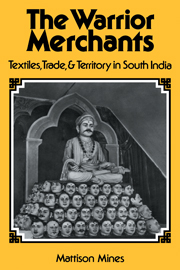Book contents
- Frontmatter
- Contents
- Preface
- Maps
- 1 Introduction
- 2 The Kaikkoolars of Tamilnadu
- 3 The Kaikkoolars and the iDangkai (left-hand) and valangkai (right-hand) castes
- 4 Kaikkoolar beliefs and the order of their social world
- 5 The naaDu system
- 6 The caste association: the Senguntha Mahaajana Sangam
- 7 Caste, politics, and the handloom weavers' cooperative movement: 1935–1971
- 8 Interpreting the Kaikkoolars today: models of caste, weaving, and the state
- References
- Glossary
- Index
4 - Kaikkoolar beliefs and the order of their social world
Published online by Cambridge University Press: 04 August 2010
- Frontmatter
- Contents
- Preface
- Maps
- 1 Introduction
- 2 The Kaikkoolars of Tamilnadu
- 3 The Kaikkoolars and the iDangkai (left-hand) and valangkai (right-hand) castes
- 4 Kaikkoolar beliefs and the order of their social world
- 5 The naaDu system
- 6 The caste association: the Senguntha Mahaajana Sangam
- 7 Caste, politics, and the handloom weavers' cooperative movement: 1935–1971
- 8 Interpreting the Kaikkoolars today: models of caste, weaving, and the state
- References
- Glossary
- Index
Summary
Kaikkoolar beliefs reveal a mental blueprint of their relationships to the cosmos and to their social world. This world is composed of the relationships of men and kingly gods; kinfolk and fierce, meat-eating gods; ritual obligations and sacrifices; the redistribution of temple honors; and the bestowal of status and political office. Kaikkoolar beliefs reveal a duality in the universe. The exterior realm is the domain of kings and state; it incorporates depictions of regnal gods, relationships of redistributive exchange, and territoriality. It is concerned with honor, status, and political domain. The interior realm is the sphere of kinsmen and small gods. It is concerned with sickness and well-being, personal fortune and misfortune, and locality. Kaikkoolar beliefs are manifested in the form of stories, and in the ordered social uses of their beliefs. These are displayed in temple ritual, and are also evident in the uses of naaDu temples and in the signs and symbols of status and identity employed by the Kaikkoolars when they are engaged in temple and naaDu affairs.
The exterior: kingly gods and territorial hierarchies
Hart has noted that “In early Tamil literature there is a dual focus: the king in puram or ‘exterior’ poems, which deal with life outside the family, and love between man and woman in akam or ‘interior’ poems, which deal with life seen from inside the family” (1975a:47). A similar distinction is made today by Kaikkoolars, who divide their sacred cosmos into two spheres. One is the sphere of small gods, who demand blood sacrifices and affect the individual's daily life. This sphere corresponds to the interior category of early poetry, because its gods are worshiped by kinsmen and are spoken of as family gods (kuladeevam).
- Type
- Chapter
- Information
- The Warrior MerchantsTextiles, Trade and Territory in South India, pp. 51 - 72Publisher: Cambridge University PressPrint publication year: 1985



